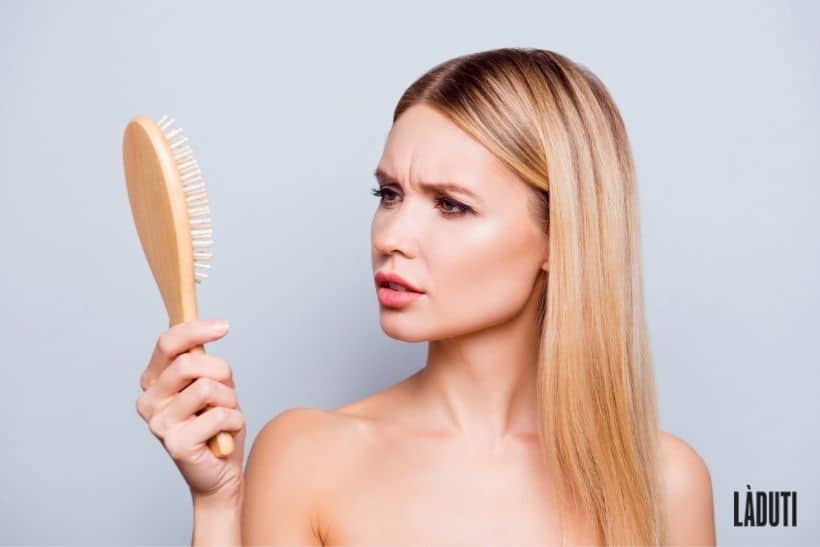An extremely unpleasant experience that many people have already had is the Hair loss. It occurs in about 40 percent of men and 20 percent of women. In order to determine the here relevant diffuse Hair loss is when the entire head is affected evenly. Often the many hairs in the brush result in panic. Women in particular suffer greatly from the loss of their hair. Bald patches on the scalp as well as dry and brittle hair reduce self-confidence and thus, under certain circumstances, considerably affect life and everyday life.
The question quickly arises: What is the reason for this? Could the hair loss be caused by iron deficiency? What else could be the cause? Above all, how can hair growth return to normal and what are the Hair Loss Treatment can help with this? These are exactly the questions addressed in the following article. Hair loss, also Alopecia is just like the iron deficiency socially quite common. Therefore, it is worth taking a closer look at the topics of hair loss and iron deficiency!
Is there a connection between hair loss and iron deficiency?
The question of whether too low an iron concentration in the body causes hair loss cannot, unfortunately, be answered explicitly by medicine with a yes or no. However, a study with mice, for example, suggested this. Mice that had too little iron due to certain diseases hardly showed any hair growth. Through the supply of iron, hair growth was gradually stimulated significantly.
Another point that makes the dependence of both factors likely is that examinations due to hair loss also frequently reveal too low ferritin values. Ferritin is a so-called iron-binding protein, the presence of which in the blood is used as a marker for iron levels.
However, these indications should not lead to the assumption that iron deficiency is the clear cause of hair loss. Rather, it occurs more frequently together with other causes. A favourable effect on hair loss, possibly also in connection with other factors, therefore seems convincing. It should be noted that the most frequent causes of hair loss or thin hair are primarily hereditary and psychological. Stress are to be attributed to.
How exactly can iron deficiency lead to hair loss?

The specific bodily processes through which iron deficiency can lead to hair loss are not conclusively understood. However, there are theories, many of which relate to the area of enzymes. Human hair growth is dependent on certain enzymes, the formation of which in turn can only function properly with sufficient iron. The cells of the hair follicles need the important trace element, as it is involved in building up the hair structure and, in the area of the sebaceous glands, also in the "suppleness" of the hair. Iron deficiency leads to an undersupply of the hair follicles, which permanently restricts hair growth. Diffuse hair loss is the result.
How to find out if you have iron deficiency?
In order to find out whether there is actually an iron deficiency that is responsible for the hair loss, a medical examination inevitable. Only a doctor can make an appropriate diagnosis by testing the blood. In addition to the ferritin value in the blood, there are other laboratory values that can be checked in this context during a blood test: Hemoglobin, Transferrin and C-reactive protein. At the same time, anemia can also be detected by a medical test. If iron deficiency anaemia is diagnosed during the medical examination, the most severe form of iron deficiency is present.
What other symptoms does iron deficiency cause?
Besides hair loss, low iron levels in the body cause other complaints. These consequences include torn corners of the mouth, thin nails, tiredness and fatigue, lower resilience and possibly even shortness of breath. Without sufficient iron, those affected also often suffer from a pronounced lack of concentration, forgetfulness, depression and anxiety. The extreme case of iron deficiency anaemia causes pale skin as well as pale conjunctiva on the eye, palpitations and low blood pressure in patients.
However, it is also possible that none of the symptoms mentioned occur and yet there is a shortage of iron. So even without the occurrence of further symptoms, it cannot be ruled out that the loss of hair is the result of an iron deficiency.
What causes iron deficiency?
The human organism produces the Trace element not independently. However, it is consumed daily by specific metabolic processes (estimated at two milligrams). As described above, our hair is also dependent on the trace element. There can be four causes for an undersupply.
1. too little iron gets into the organism
The first and most common reason is an insufficient amount of iron, which can be removed by means of Nutrition enters the body. Animal products in particular, especially meat, contain a lot of iron. This is why vegetarians and vegans suffer more often from deficiency symptoms such as hair loss. Some plant foods also contain iron, but it is more difficult for the body to absorb it. Some of the plant foods also have inhibitors, i.e. they actively counteract iron absorption in the blood and intestines. Vitamin C, on the other hand, helps with iron absorption.
It is of course also conceivable that due to a Diet or diseases too little food or calories are consumed. An example of such a condition is anorexia. Likewise, a poor diet that contains too much sugar or fat has a negative effect on the iron balance and promotes further hair loss.
2. iron is not absorbed
A second cause can be found in the non-absorption of the trace element by the body. Iron is absorbed in the intestine - especially in the duodenum. So if there is a disorder in the function of this organ, e.g. an inflammatory bowel disease, this process is impaired.
3. increased iron demand
A third reason is the increased iron requirements of certain groups of people. Athletes, for example, need iron, Children in the growth phase, women during the Pregnancy and Breastfeeding and heavily menstruating women more iron. It is not uncommon for women to complain about Hair loss during pregnancy. The average daily requirement is otherwise about 10 mg for men and 15 mg for women.
4. loss of iron
The fourth cause is a iron lossthat is already in the body. Acute blood loss due to e.g. injuries, childbirth or blood donations can be responsible here. Chronic blood loss or anaemia are also conceivable, triggered by diseases such as stomach ulcers or tumours. Contact a doctor if you have any suspicion of this! A therapy is absolutely necessary in this case.
What can be done about iron deficiency?
First of all, the exclusion procedure should be applied here. In the first step, it is important to find out whether it is really hair loss or whether the loss of hair is still in the daily normal range. For this purpose, it is possible to make an appropriate test. However, if it has been determined that the hair loss is alopecia, the second step should be to detect a possible iron deficiency. If such a deficiency is present, doctors can work with patients to look for the Research cause. Without knowledge of the cause, appropriate therapy or treatment is difficult.
In the case of a deficiency, the cause of which is an incorrect or unbalanced diet, many sufferers make the decision for a Change of diet. This is not only advisable because of hair loss, but for the sake of health in general. If the consumption of animal products is out of the question, this should be compensated for by various plant-based foods with a high iron content.
Green leafy vegetables such as spinach or chard, dried fruits, nuts or almonds and salad are foods that are particularly good at counteracting an iron deficiency and can reduce hair loss. In addition, treatment with Iron supplements may be considered under certain circumstances. They may also be given in the case of minor blood loss, such as in women with heavy menstruation or similar. However, talk to your family doctor about this beforehand. In the case of a worryingly high iron deficiency, a doctor will administer the trace element intravenously. Under no circumstances is it advisable to take iron supplements as a precaution for hair loss. Because too much iron harms the body and at the same time brings no advantage to the hair.
Natural care products to support hair growth
In addition to a change in diet and iron supplements, care products can also be used to promote natural hair growth again. Support the regeneration of your hair with the Hair growth serum from Laduti. Based on natural ingredients, the serum was developed to support hair growth. The special care contains 60 ingredients and is free of hormones and Minoxidil.
Conclusion
When it comes to hair loss and iron deficiency, there are a few important points to remember. If you notice that you are suffering from hair loss, do not panic immediately. The exclusion procedure and the correct diagnosis are important here. It should be determined whether there is an iron deficiency that is causing the hair not to grow as usual. If, in addition to hair loss, other symptoms that indicate an iron deficiency can be detected, contacting a doctor is strongly recommended. If the iron level is indeed too low, the connection to the thin hair is not certain, but highly probable.
Depending on the cause of the low iron level, action can then be taken against it. A change in diet or iron supplements can bring the supply of iron and ferritin in the body of the affected person back into balance over a certain period of time. Stimulate hair growth and thus prevent the psychological consequences of hair loss! If you want to support your hair growth in a natural way, we recommend the use of our Laduti products.
FAQ - Questions and answers
What are the symptoms of iron deficiency?
The most common symptoms of iron deficiency include: Severe hair loss, dull hair, brittle nails, skin dryness, cracked corners of the mouth, pale skin and mucous membranes, fatigue, pronounced feeling of cold, headaches, loss of performance, shortness of breath and depression.
What to do for hair loss due to iron deficiency?
A healthy and balanced diet is the be-all and end-all. Iron should be included in the diet every day. Fresh, green leafy vegetables and salads, dried fruits, nuts, legumes such as peas, beans and lentils and dark meat help to compensate for iron deficiency. With plant foods, iron intake should always be supported with foods containing vitamins, for example oranges, tangerines, broccoli or red peppers.
When does hair grow back after an iron deficiency?
After the iron deficiency is diagnosed as the cause of the hair loss, it is treated with the help of a change in diet and/or iron supplements. If the hair loss is stopped, it usually takes 6 to 12 months until the hair grows back again.



